Candide (Barnes & Noble Classics Series) Read online
Page 3
Believing he has killed Cunégonde’s brother, Candide (with Cacambo in tow) promptly takes to the road again, rescues two young girls amorously pursued by monkeys, and is captured by the Oreillons, a tribe of cannibalistic Indians with a special liking for Jesuit flesh; the two are freed when the resourceful Cacambo persuades the Indians that his master, far from being a Jesuit, has just killed one. Pursuing their journey, Candide and Cacambo painfully reach the isolated country of El Dorado, surrounded by nearly impassable mountains and precipices, and find themselves in a utopian society that, as an enlightened monarchy, offers its subjects the abundant fruits of its natural riches, as well as peace, prosperity, liberty, tolerance, and justice. After two months in this happy retreat, Candide becomes restless and decides to resume his travels and his quest for his beloved Cunégonde. He and Cacambo set out with a hundred sheep, plentiful provision, and huge amounts of gold, diamond, and other precious stones. However, after a hundred days of strenuous travel, only two sheep survive. In Surinam, a Dutch colony, they encounter an African slave missing his left leg and right hand, the result of the barbaric treatment he has incurred while working in the sugar mills of his master. “It is at this cost that you eat sugar in Europe,” is his sad comment.
Trying in vain to rejoin Cunégonde, the too-trusting Candide is promptly swindled out of most of his possessions. In order to have a better chance at rescuing Cunégonde, Candide sends the more worldy-wise Cacambo to Buenos Aires and he plans to await them in Venice. He sets sail for Bordeaux in the hope of reaching his destination by way of Paris, after having selected as a traveling companion an impoverished scholar named Martin, who has also been the victim of many misfortunes and who, as a Manichaeist, is the pessimistic counterpart of Pangloss. In Paris, Candide is introduced into high society, with its fine suppers, slanderous gossip, and gambling at cards. Arrested as a suspicious foreigner, he buys his freedom with some of his diamonds from El Dorado and is shipped off to Portsmouth, England, where he witnesses the summary execution of Admiral Byng. From Portsmouth, Candide proceeds to Venice, where he encounters Paquette, Cunégonde’s maid, and Cacambo, who informs him that Cunegonde is in Constantinople. In Venice, he is the guest of Senator Pococuranté, a wealthy Venetian nobleman whose social privileges and riches have made him a complete disbeliever in the ultimate value of all cultural and literary achievements.
In the Venetian galley that carries Candide to Constantinople, where he hopes to reunite with his beloved Cunégonde, Candide unexpectedly finds Pangloss and Cunégonde’s brother among the galley slaves. He is informed that Pangloss survived his hanging in Lisbon because of a bungled knot and that Cunégonde’s brother survived his wound, which had not been fatal after all. When Candide and his companions arrive in Constantinople, they buy Cunégonde and the old woman from their masters. By then, however, Cunégonde has lost her good looks, but Candide feels he cannot go back on his word, while her brother obstinately persists in his objections, which can only be overcome by having him sent back to complete his stint as a galley slave.
Upon arriving in Constantinople, Candide purchases a little farm, but after having survived so many disasters the little group cannot at first easily settle into a calm, uneventful existence. Pangloss still tries to lecture his erstwhile disciple, but the latter interrupts the learned doctor with the simple, pragmatic, and ultimately hopeful observation that “we must cultivate our garden.” In other words, life is made bearable by useful activity rather than by idle theorizing.
To summarize the plot of Candide is of course to leave out what makes it one of the great masterpieces of satirical and comical literature. It is a fast-paced adventure story and travelogue, an unsentimental love story, a fantasy replete with history. Comic effects are generally achieved by the staccato rhythm of the narration, by the jarring contrast between the dramatic content and the coolly dispassionate style, and by the absence of any psychological depth for the major characters of the tale, which makes them like marionettes, manipulated at will by their creator.
While it is a ferocious attack on philosophical optimism, Candide is not a pessimistic work, for it proclaims the human capacity to survive the worst calamities and to endure and even prosper in a world replete with war, cruelty, misery, persecution, and religious intolerance.
Gita May is Professor of French at Columbia University. She has published extensively on the French Enlightenment, eighteenth-century aesthetics, Diderot and Rousseau, literature and the arts, the novel and autobiography. the revolutionary and post-revolutionary era, and women in literature, history, and the arts. She is the author of Diderot et Baudelaire, critiques d’art (1957, second ed. 1967), De Jean-Jacques Rousseau à Madame Roland (1964), Madame Roland and the Age of Revolution (winner of the Van Amringe Distinguished Book Award; 1970), Stendhal and the Age of Napoleon (1977), extensive monographs on Julie de Lespinasse (1991), Elisabeth Vigée Le Brun (1994), Germaine de Staël (1995), George Sand (1994), Rebecca West (1996), and Anita Brookner (1997), and numerous articles, contributions to collections of essays, and book reviews and review articles. She was honored by the American Society for Eighteenth-Century Studies as one of the Society’s “Great Teachers.”
I
How Candide was brought up in a magnificent castle; and how he was driven out of it
In the country of Westphalia,a in the castle of the most noble baron of Thunder-ten-tronckh, lived a youth whom nature had endowed with a most sweet disposition. His face was the true index of his mind. He had a solid judgment joined to the most unaffected simplicity; and hence, I presume, he had his name of Candide. The old servants of the house suspected him to have been the son of the baron’s sister by a very good sort of a gentleman of the neighbourhood, whom that young lady refused to marry, because he could produce no more than seventy-one quarteringsƗ in his arms, the rest of the genealogical tree belonging to the family having been lost through the injuries of time.
The baron was one of the most powerful lords in Westphalia, for his castle had not only a gate, but even windows, and his great hall was hung with tapestry. He used to hunt with his mastiffs and spaniels instead of greyhounds; his groom served him for huntsman, and the parson of the parish officiated as his grand almoner. He was called “My Lord” by all his people, and everyone laughed at his stories.
My Lady Baroness weighed three hundred and fifty pounds, and consequently was a person of no small consideration; and she did the honours of the house with a dignity that commanded universal respect. Her daughter, Cunégonde, was about seventeen years of age, fresh-coloured, comely, plump and amiable. The baron’s son seemed to be a youth in every respect worthy of his father. Pangloss, ǂ the tutor, was the oracle of the family, and little Candide listened to his instructions with all the simplicity natural to his age and disposition.
Master Pangloss taught the metaphysico-theologo-cosmolonigology. b He could prove admirably that there is no effect without a cause, and in this best of all possible worlds the baron’s castle was the most magnificent of all castles, and my lady the best of all possible baronesses.
“It is demonstrable,” said he, “that things cannot be otherwise than they are; for as all things have been created for some end, they must necessarily be created for the best end. Observe, for instance, the nose is formed for spectacles; therefore we wear spectacles. The legs are visibly designed for stockings; accordingly we wear stockings. Stones were made to be hewn and to construct castles; therefore my lord has a magnificent castle; for the greatest baron in the province ought to be the best lodged. Swine were intended to be eaten; therefore we eat pork all year round. And they who assert that everything is right, do not express themselves correctly; they should say that everything is best.”1
Candide listened attentively, and believed implicitly; for he thought Miss Cunégonde excessively handsome though he never had the courage to tell her so. He concluded that after the happiness of being Baron of Thunder-ten-tronckh, the next was that of being Miss Cunégonde, the nex
t that of seeing her every day, and the last that of hearing the doctrine of Master Pangloss, the greatest philosopher of the whole province, and consequently of the whole world.
One day when Miss Cunégonde went to take a walk in the little neighbouring woods, which was called a park, she saw through the bushes the sage Dr. Pangloss giving a lecture in experimental philosophy to her mother’s chambermaid, a little brown wench, very pretty and very tractable. As Miss Cunégonde had a natural disposition toward the sciences, she observed with the utmost attention the experiments which were repeated before her eyes; she perfectly well understood the force of the doctor’s reasoning upon causes and effects. She returned home greatly flurried, quite pensive and filled with the desire of knowledge, imagining that she might be a sufficing reason for young Candide, and he for her.
On her way back she happened to meet Candide. She blushed; he blushed also. She wished him a good morning in a flattering tone; he returned the salute without knowing what he said. The next day. as they were rising from the dinner table, Cunégonde and Candide slipped behind a screen; Miss dropped her handkerchief; the young man picked it up. She innocently took hold of his hand, and he as innocently kissed hers with a warmth, a sensibility, a grace—all very particular: their lips met; their eyes sparkled; their knees trembled; their hands strayed. The baron chanced to come by; he took note of the cause and effect, and without hesitation saluted Candide with some notable kicks on the rear, and drove him out of the castle. Miss Cunégonde, the tender, the lovely Miss Cunégonde, fainted away, and, as soon as she came to herself, the baroness boxed her ears. Thus a general consternation was spread over this most magnificent and most agreeable of all possible castles.
II
What happened to Candide among the Bulgarians2
Candide, driven out of this earthly paradise, wandered a long time without knowing where he went; sometimes he raised his eyes, all wet with tears, towards heaven, and sometimes he cast a melancholy look towards the magnificent castle, where the fairest of young baronesses lived. He laid himself down to sleep in a furrow, heart-broken, and supperless. The snow fell in great flakes and in the morning, when he awoke, he was almost frozen to death; however, he dragged himself to the next town, which was called Walds-berghoff-trarbk-dikdorff, without a penny in his pocket, and half dead with hunger and fatigue. He took up his stand at the door of an inn. He had not been long there, before two men dressed in bluec fixed their eyes steadfastly upon him. “Faith, comrade,” said one of them to the other, “there is a well-made young fellow, and of the right size”; upon which they approached Candide, and with the greatest civility and politeness invited him to dine with them. “Gentlemen,” replied Candide, with a most engaging modesty, “you do me much honour; but I really don’t have enough money to pay my share.” “Money, sir,” said one of the blues to him, “young persons of your appearance and merit never pay anything; why, are not you five feet five inches tall?” “Yes, gentlemen, that is really my size,” replied he, with a low bow. “Come then, sir, sit down with us; we will not only pay your bill, but we will never allow such a clever young fellow as you to be short on money. Mankind were born to assist one another.” “You are perfectly right, gentlemen,” said Candide, “this is precisely the doctrine of Master Pangloss ; and I am convinced that everything is for the best.” His generous companions next begged him to accept a few crowns, which he readily complied with, at the same time offering them an I.O.U. for the payment, which they refused, and then sat down at the table together. “Have you not a great affection for———?” “O yes; I have a great affection for the lovely Miss Cunégonde.” “Maybe so,” replied one of the blues; “but that is not the question. We are asking you whether you have not a great affection for the King of the Bulgarians?” “For the King of the Bulgarians?” said Candide. “Oh, Lord! not at all; why, I never saw him in my life.” “Is it possible! Oh, he is a most charming king. Come, we must drink his health.” “With all my heart, gentlemen,” says Candide, and he drinks his glass. “That will do!” cry the blues; “you are now the support, the defender, the hero of the Bulgarians; your fortune is made; your future is assured.” So saying, they handcuff him, and carry him away to the regiment. There he is made to wheel about to the right, to the left, to draw his rammer, to return his rammer, to present, to fire, to march; and they give him thirty blows with a cane. The next day he performs his exercise a little better, and they give him but twenty. The day after he comes off with ten, and is looked upon as a young fellow of surprising genius by all his comrades.
Candide was struck with amazement and really could not conceive how he came to be a hero. One fine spring morning he took it into his head to take a walk, and he marched straight forward, conceiving it to be a privilege of the human species, as well as of animals in general, to make use of their legs how and when they pleased. He had not gone above two leagues when he was overtaken by four other heroes, six feet high, who bound him neck and heels and carried him to a dungeon. At the court-martial, he was asked which he preferred: to be flogged thirty-six times by the whole regiment, or to have his brains blown out with a dozen musket balls. In vain did he remonstrate with them, that the human will is free, and that he chose neither. They pressed him to make a choice, and he determined, in virtue of that divine gift called free-will, to be flogged thirty-six times. He had gone through two floggings, and the regiment being composed of 2,000 men, that made for him exactly 4,000 strokes, which lay bare all his muscles and nerves from the nape of his neck to his rump. As they were preparing to make him set out the third time our young hero, unable to support it any longer, begged as a favour they would be so obliging as to shoot him through the head. The favour being granted, a bandage was tied over his eyes, and he was made to kneel down. At that very instant the King of the Bulgars, happening to pass by, made a stop and enquired into the delinquent’s crime, and being a prince of great genius, he found, from what he heard of Candide, that he was a young metaphysician, entirely ignorant of the world; and therefore, out of his great clemency, he condescended to pardon him, for which his name will be celebrated in every journal and in every age. A skilful surgeon cured the flagellated Candide in three weeks, by means of emollient unguents prescribed by Dioscorides.d His sores were now skinned over, and he was able to march, when the King of the Bulgarians gave battle to the King of the Abares.3
III
How Candide escaped from the Bulgarians, and what happened to him afterwards
Never was anything so gallant, so well accoutred, so brilliant, and so finely disposed as the two armies. The trumpets, fifes, oboes, drums and cannon made such harmony as never was heard in hell itself. The entertainment began by a discharge of the cannon, which in the twinkling of an eye lay flat about 6,000 men on each side. The musket balls swept away, out of the best of all possible worlds, nine or ten thousand scoundrels that infected its surface. The bayonet was next the sufficient reasone of the deaths of several thousands more. The whole might amount to 30,000 souls. Candide trembled like a philosopher, and concealed himself as well as he could during this heroic butchery.
At length, while the two kings were causing “Te Deum”Ɨ to be sung in each of their camps, Candide decided to go and reason somewhere else upon causes and effects. After passing over heaps of dead or dying men, the first place he came to was a neighbouring village in the Abarian territories which had been burnt to the ground by the Bulgarians, in accordance with the laws of war. Here lay a number of old men covered with wounds, who beheld their wives dying with their throats cut, and hugging their children to their breasts, all stained with blood. There several young virgins whose bodies had been ripped open, after they had satisfied the natural necessities of the Bulgarian heroes, breathed their last; while others, half burnt in the flames, begged to be despatched out of the world. The ground about them was covered with the brains, arms and legs of dead men.
Candide made haste to another village, which belonged to the Bulgarians, and there he found
that the heroic Abares had enacted the same tragedy. From there, continuing to walk over palpitating limbs, or through ruined buildings, at length he arrived beyond the theatre of war, with a little provision in his budget and Miss Cunégonde’s image in his heart. When he arrived in Holland, his provisions ran out; but having heard that the inhabitants of that country were all rich and Christians, he made himself sure of being treated by them in the same manner as at the baron’s castle, before he had been driven from there through the power of Miss Cunégonde’s bright eyes.
He asked charity of several grave-looking people, who one and all answered him, that if he continued to beg, they would have him sent to the house of correction, where he would be taught to earn his bread.
He next addressed himself to a personf who was just come from haranguing a numerous assembly for a whole hour on the subject of charity. The orator, squinting at him under his broad-brimmed hat, asked him sternly what brought him there, and whether he was for the good cause? “Sir,” said Candide in a submissive manner, “I conceive there can be no effect without a cause; everything is necessarily concatenated and arranged for the best. It was necessary that I should be banished from the presence of Miss Cunégonde; that I should afterwards be flogged; and it is necessary that I should beg for my bread, till I am able to get it: all this could not have been otherwise.” “Hark ye, friend,” said the orator, “do you think the Pope is Antichrist?” “Truly, I never heard anything about it,” said Candide; “but whether he is or not I am in want of something to eat.” “Thou deservest not to eat or to drink,” replied the orator, “wretch, monster that you are! Away with you! Out of my sight, never come near me again as long as you live.” The orator’s wife happened to put her head out of the window at that instant, when, seeing a man who doubted whether the Pope was Antichrist, she emptied on his head a chamber-pot full of——Good heavens! to what excess does religious zeal transport the female kind.

 Zadig/L'Ingénu
Zadig/L'Ingénu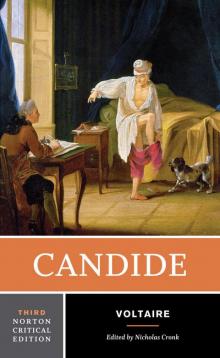 Candide
Candide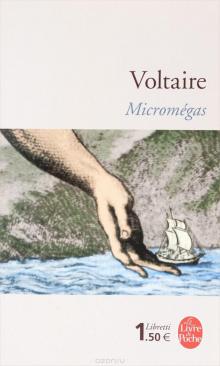 Micromegas
Micromegas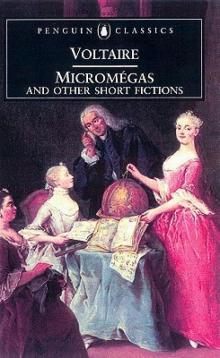 Micromegas and Other Short Fictions (Penguin ed.)
Micromegas and Other Short Fictions (Penguin ed.)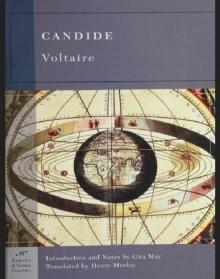 Candide (Barnes & Noble Classics Series)
Candide (Barnes & Noble Classics Series)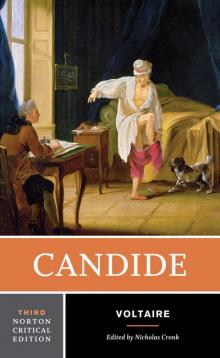 Candide (Third Edition) (Norton Critical Editions)
Candide (Third Edition) (Norton Critical Editions) Zadig or L'Ingenu
Zadig or L'Ingenu